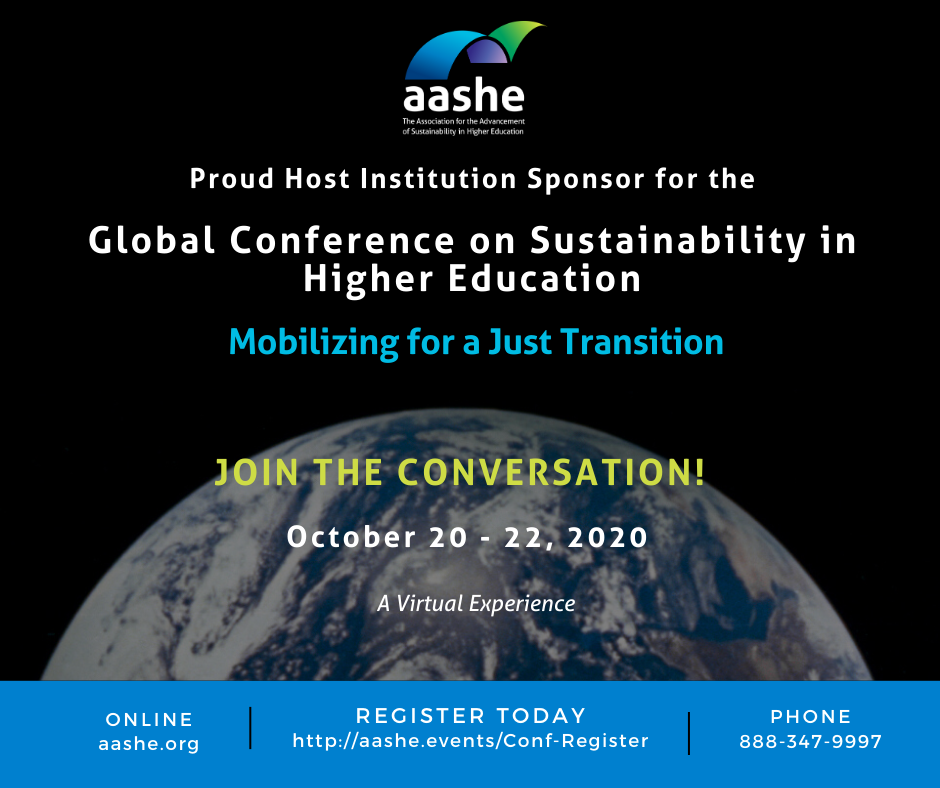Hanley Sustainability Institute

Update to University of Dayton carbon neutrality study among presentations in global sustainability conference
By Mark Gokavi
The update to a study on making the University of Dayton carbon neutral by 2025 is among the UD presentations at the 2020 Global Conference on Sustainability in Higher Education.
UD is among a group of host institutions for GCSHE, a virtual event which takes place Oct. 20-22. The host status enables free registration for anyone with a @udayton.edu email address (by entering the discount code UDAYTONEDU093020) and allows access to more than 300 on-demand sessions until Nov. 22.
Led by former graduate assistant Ryan Shea, the study shows that converting UD into a fully-electrified, renewably powered, carbon-neutral campus by 2025 would increase costs by just 2.4 percent over a 30-year period.
The paper was published in the journal Sustainable Energy Technologies and Assessments by UD engineering professors Andrew Chaisson and Kelly Kissock, Hanley Sustainability Institute executive director Ben McCall, UD energy efficiency and renewable energy manager Matthew Worsham, and 2019 graduate Shea.
UD faculty, staff and students are part of six presentations during the three-day conference. The full schedule is here and UD’s sessions are listed below.
Highlights of the findings of Shea’s study include building energy efficiency could reduce emissions by 12 percent and save $10 million in that time frame; an electric vehicle fleet could reduce emissions by 0.4 percent and save $2 million; geothermal heat pumps could eliminate natural gas emissions at a cost of $15.5 million; and an off-site renewable power purchase agreement (PPA) could eliminate electricity emissions with an additional estimated cost of $1.7 million.
The full transition would increase energy-related costs from $211.8 million to $216.9 million during the next 30 years, but would require significant capital expenditures in the first several years.
The abstract of the paper emphasizes the importance of considering such a transition, factoring in the challenge of substantial up-front investments, the potential of future regulatory mechanisms like carbon pricing that would internalize the social cost of carbon and the “urgent need to reduce” global greenhouse gas emissions.
Worsham said it was great to work with and learn from other faculty and staff on campus.
“Throughout our study, we took advantage of opportunities to use our campus as a laboratory for student learning,” he said. “We hope that other campuses find our work useful for framing their carbon neutrality work.
“Immediately following our study, we got to work implementing the team's recommendations. This has been hard work, but it's been good to know our carbon neutrality commitment really is feasible and the hard work will pay off.”
Shea, now a senior associate at Rocky Mountain Institute in Boulder, Colorado, said universities are uniquely equipped to invest in green solutions and positioned to educate the climate leaders of tomorrow. He also said UD has an immense opportunity to eliminate fossil fuel dependence and power the campus with renewable energy.
“We are living in a climate emergency. It’s high time that universities start acting like it,” Shea said. “They can start by not contributing to the problem with their continuous burning of fossil fuels and start implementing clean energy solutions.”
McCall said the dollars make sense.
“Our analysis shows that it is feasible for the University of Dayton to become carbon neutral: not just from a technical perspective, but also from an economic perspective … if we take the long view,” he said. “It's really critical that we do so, in order to provide leadership in helping to avert catastrophic climate change, and also to hedge against the risk of future carbon pricing."
“UD has to stop burning fossil fuels in its buildings to be carbon neutral and electrical heat pumps are a viable pathway to doing that,” Shea said. “UD is currently losing money by not maximizing their investments in building energy efficiency measures, electric vehicles, and renewable energy.”
UD-LED GCSHE LIVE SESSIONS
OCT. 21
10-10:40 a.m. - What’s Missing? Reconsidering the Key Competencies in Sustainability Education. Presenter: Rebecca Potter, sustainability program director, HSI curriculum director
2:15-3:40 p.m. - Biodiversity Assessment for Non-Biologists: Tools for Completing the STARS Credit; Presenter: Leah Ceperley, UD’s sustainability and planning evaluation manager
4-5 p.m.: Energy Management During a Global Pandemic, networking and discussion group. Presenter: Matthew Worsham, UD’s energy efficiency and renewable energy manager
OCT. 22
2-2:40 p.m. - Beyond the Ivory Walls: Community Based Sustainable Solutions for Building Local Resilience; Presenters: UD sustainability professor Felix Fernando, HSI graduate assistants Lauren Wolford and Meg Maloney
UD-LED GCSHE ON-DEMAND SESSIONS
Planning and Progress Toward Carbon Neutrality, Year Two. Presenters: Ryan Shea, senior associate, Rocky Mountain Institute; Ben McCall, HSI executive director; Worsham
Renewable Energy Procurement: Strategy Development and Stakeholder Engagement. Presenters: McCall; Christina Yagjian, senior management/client services, Edison Energy; Christopher Wettle, Stillwater Creek Solutions
